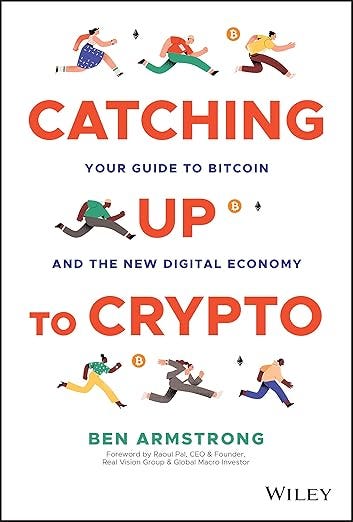Bitcoin Soared In 2024 - Should You Own Any?
📈 Here's the latest progression on this Cryptocurrency!
Here’s what to expect in this newsletter!
(P.S. If this newsletter is cut off in your email just visit our Substack!)
📰 Interesting financial news: Stay up to date on what’s happening in the economy.
📈 What’s popping in the stock market: The 411 on trending/interesting stock market news.
📝 This week’s main topic: What this newsletter’s title is about!
🥰 Team CGF’s Amazon favs: Affordable yet helpful Amazon finds.
📰 Interesting financial news
Trade wars begin: What you need to know for your wallet, portfolio and more. (USA Today)
Millions of student borrowers are behind on loans — and may see their credit scores tank. (CNBC)
Nationwide egg shortage has shoppers turning to Facebook Marketplace. (New York Post)
📈 What’s popping in the stock market
If you’re thinking about selling your stocks, you might want to think twice.
Macy’s sinks to lowest level since 2023 after issuing disappointing outlook. (Ticker Symbol: M)
Costco will open a dozen new US stores over the next six months. (Ticker Symbol: COST)
📝 Main topic: Bitcoin is becoming a popular investment - is it right for you?

Bitcoin, the world’s largest cryptocurrency, became one of the best-performing investments of 2024. Its price soared approximately 125%, climbing from the $40,000 range at the start of the year to around $94,000 by the end of the year.
Another major change in the crypto world happened last year when the Securities and Exchange Commission (SEC), approved exchange-traded funds that invest directly in Bitcoin and Ether. Making it easier for retail investors to buy crypto.
Now, the question is - does this new success mean Bitcoin is a smart investment?
The volatility of crypto
Since September 2015, Bitcoin has been nearly five times more volatile than U.S. stocks, while Ether has been almost 10 times as volatile, according to Amy Arnott, a portfolio strategist for Morningstar Research Services.
Bitcoin also saw major losses, dropping 64% in 2022 and 74% in 2018. With these deep declines, investors need a 100% return to offset a 50% loss.
The risk may be worth taking because of crypto's recent high returns by including Bitcoin or Ether in an already well diversified portfolio.
That said, like almost all investments, cryptocurrency has its risks and advantages. If you’re wondering if Bitcoin is something you should invest in, here’s our take.

How Bitcoin and Blockchain technology are influencing other markets
Before investing in any stock, it is important to understand the company’s growth in the past, present, and future.
1. Growing adoption and institutional interest
Major companies, financial institutions, and even governments are integrating crypto into their operating systems, signaling long-term viability.
Corporate adoption: Businesses are increasingly incorporating cryptocurrencies into their financial strategies. Integrating Bitcoin into corporate treasury operations offers benefits such as protection against inflation, reduced reliance on traditional financial institutions, and enhanced liquidity.
Institutional interest: Financial institutions such as JPMorgan, Barclays, Citigroup, and Goldman Sachs, have been actively engaging with the crypto market. These big banks are backing major bond deals for crypto companies, showing a change in how they view the industry.
Government integration: The concept of a national crypto reserve is being explored as a strategic asset to traditional reserves like gold. Proponents argue that such reserves could reduce national debt and position cryptocurrencies as long-term financial assets.
2. Blockchain technology has real-world applications
Crypto isn’t just about digital coins; blockchain technology is impacting industries like real estate and healthcare.
Healthcare: When a patient visits multiple healthcare providers, their information ends up scattered amongst different platforms. However, Blockchain has the potential to create a unified and secure place where authorized providers can access a patient’s complete medical history.
Real estate: Real estate tech has mostly focused on listings and connecting buyers with sellers. However, platforms like ATLANT use blockchain to turn properties into digital tokens, allowing them to be traded like stocks. Sellers can tokenize their properties, and sell shares through the platform, and buyers can own a percentage of the property. The tokens can then be exchanged for cash.
3. Regulations are evolving, not eliminating crypto
Governments are working on clearer regulations, reinforcing that crypto is a legitimate asset class rather than a passing trend.
Congress has considered multiple bills aimed at regulating the cryptocurrency industry. Key themes include the creation of a stablecoin bill and a comprehensive federal regulatory framework for digital assets.
Additionally, the Financial Innovation and Technology for the 21st Century Act (FIT21) is under consideration to address broader aspects of digital asset regulation.
4. Decentralization offers an alternative to traditional finance
Crypto provides a way to store and transfer wealth without relying on centralized banks. This means users have direct control over their funds without needing approval from a third party, making crypto resistant to government-imposed restrictions, bank failures, and currency devaluation.
Crypto can also protect against inflation because of its fixed supply of 21 million BTC, which means its value doesn’t fluctuate like printing money. Similar to gold, Bitcoin is a limited supply which means it’s less likely to be affected by inflation.
What to keep in mind if you decide to buy Bitcoin or other Crypto
Owning crypto can be a smart move for several reasons, but it’s important to approach it with the right mindset.
1. Only invest what you can afford to lose
Crypto markets can swing wildly, and regulations are still evolving. Be mentally and financially prepared for ups and downs. If losing money would cause financial stress or sleepless nights, you need a different investment strategy.
Take a look at your budget. If you were to throw $100 out the window, would you still be able to go about your life? Consider how much money you have left over after you pay your bills and how much money you have for fun things.
2. Research before you buy
Don’t just follow the hype. Understand the project behind the cryptocurrency, its use case, team, and potential risks before investing.
One way to research crypto is by reading white papers. These are documents that explain the purpose, history, and future projections of crypto projects. Other ways to research include:
Staying up to date with crypto regulations
Following social media updates
Paying attention to who is using crypto
3. Diversification is key—don’t go all in
While crypto has potential, it’s still volatile. Treat it as part of a well-balanced investment portfolio rather than your entire financial plan. Consider crypto funds held through reputable brokerages for peace of mind and even broader diversification.
4. Security matters
Store your crypto safely using a reputable wallet. Hardware wallets (cold storage) are best for long-term holding, while software wallets are more convenient for trading.
Also, consider spreading your crypto across different storage platforms and using two-factor authorization.
5. Beware of scams
The crypto space is full of scams, from fake investment schemes to phishing attacks. Always double-check sources before investing or clicking on links.
Popular scammers will try to get you to send Bitcoin in advance. Some scammers impersonate popular institutions and try to get you to send Bitcoin.
Lastly, if anyone promises you that you’ll get a big return if you invest, then they are most likely trying to scam you. No one can guarantee a certain investment outcome.
6. Know the tax implications
Crypto transactions, including buying, selling, and staking, may be taxable. Keep track of your trades and check tax regulations in your country.
The IRS views cryptocurrency as property and not currency, which means using crypto will be subject to the capital gains tax rules. This rule states that you have to pay a tax if you sell an item for more than you purchased it.
7. Have an exit strategy
If you start investing in crypto, make sure you have clear financial goals. Why are you investing in this market? What do you hope to achieve over time? Your goals will dictate how you manage your investment.
Additionally set limits for yourself. Decide at which price point you’ll take products. Determine how much loss you can take before exiting.
Lastly, you may want to consider differing selling strategies such as selling small portions over time, selling increments at different price points, or holding on to a percentage of your crypto in case the market changes.
—
There’s a lot to consider if you thinking of investing in Bitcoin or other cryptocurrencies. With any financial decisions, it’s important to do what’s best for you and your lifestyle.
If you’d like to learn more about investing, consider taking our completely free course on investing.
🥰 Team CGF’s Amazon Favs: Crypto 101 reads and tools to get started with
Cryptocurrency can feel overwhelming, but the right resources can help you understand the basics, avoid common pitfalls, and make informed decisions. Whether you're a beginner or looking to level up your knowledge, these Amazon picks will guide you on your crypto journey.
P.S. If you make a purchase we may earn a commission, this helps us grow!
Catching Up to Crypto: Your Guide to Bitcoin and the New Digital Economy

Catching Up to Crypto by Ben Armstrong breaks down what Bitcoin is, how it works, and why our financial system is moving toward digital assets. He also explains the problems with traditional money—like how it’s manipulated—and why crypto could be a game-changer.
More than defining crypto, Armstong dives into Bitcoin’s backstory, how it almost died out, and how it became this global phenomenon. Plus, he covers how blockchain technology works, why decentralization matters, and how crypto is reshaping finance.
If you’re even a little curious about crypto, this book makes it easy to understand.
The Basics of Bitcoins and Blockchains: An Introduction to Cryptocurrencies and the Technology that Powers Them

If you’d like to deep dive into the world of Bitcoin and Blockchain technology but don’t want to get overwhelmed this is the book for you. The Basics of Bitcoins and Blockchains is your straightforward, no-nonsense guide to making sense of it all. It’s perfect for you if you know nothing or if you want to deepen your knowledge.
The book breaks down:
What cryptocurrencies are and how they work
How blockchain technology is being used across different industries
Get practical investment advice and learn how to avoid the scams
If you want to confidently navigate the world of Bitcoin and blockchain without feeling lost, this book is the perfect place to start.
Tangem Wallet: Trusted Cold Storage for Bitcoin, Ethereum, NFT's & More Coins

If you’re ready to invest in Bitcoin then you’re going to need a safe place to store your coins. Cold storage, or physical hard drives, is one of the safest places to keep your crypto.
With the Tangem Wallet, you can store, send, and trade over 13,000 tokens across more than 70 different blockchains.
It’s also easy to use. No wires or Bluetooth are needed. You can just tap the card on Tangem app and have instant access to secure storage.
With a 25-year guarantee, this wallet will help keep you on your Bitcoin game.





